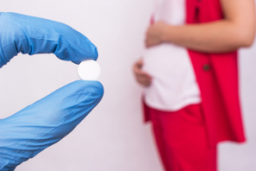Why is it so important to take vitamin D during pregnancy?
Pregnant women often lack this vitamin
Vitamin D deficiency during pregnancy has been linked to various maternal and foetal complications, such as pre-eclampsia, gestational diabetes, prematurity or low birth weight.
Interest in vitamin D has increased in recent years due to its association not only with calcium metabolism, but also with the development of infectious diseases, autoimmune diseases, type 2 diabetes and high blood pressure. This concern is growing as multiple studies have found that serum vitamin D insufficiency in healthy populations is more common than expected.
The most important cause of hypovitaminosis D is lack of sunlight exposure, so in Mediterranean countries like Spain, with many hours of sun throughout the year, this problem should hardly exist. However, studies carried out there confirm there is vitamin D insufficiency in healthy adults, children and pregnant women.
Lack of vitamin D and pregnancy complications
During pregnancy, vitamin D deficiency has been associated with various maternal and foetal complications. The development of gestational hypertension and pre-eclampsia (high blood pressure and protein in the urine) in pregnant women with low vitamin D levels has been widely studied, with a five-fold increased risk of pre-eclampsia described in pregnant women with vitamin D levels below 50 nmol/l. Gestational diabetes, the performance of a caesarean section in the first pregnancy, premature birth and low birth weight have also been linked to hypovitaminosis D.
Prenatal supplements help
Vitamin D supplementation during pregnancy is associated with increased serum vitamin D levels and increased foetal weight and height at birth, according to recent meta-analyses. Most polyvitamins current given to pregnant women include vitamin D3 with a dose of 5 mcg/day (200 units/day) of cholecalciferol.
But are the prescribed doses really sufficient to achieve adequate serum vitamin D levels in pregnant women? Do women pregnant with twins have lower serum vitamin D levels because the requirements of two foetuses are always higher than one?
Study on vitamin D and pregnancy in Madrid
To answer these questions, we carried out a study at La Paz Hospital (Madrid) between March 2012 and February 2014 where vitamin D levels were measured in a total of 227 pregnant women: 130 (57%) single pregnancies and 97 (43%) of twins:
- None of the pregnant women were smokers, obese (Body Mass Index over 30 kg/m2), hypertensive or diabetic.
- All were given a polyvitamin complex including a daily dose of vitamin D3 (cholecalciferol) of 5 mcg/day for at least three weeks prior to the determination of vitamin D level.
- Serum vitamin D levels were measured at the end of the first trimester of pregnancy (between 12 and 14 weeks). They were classified as normal (> 30 ng/ml), insufficient (between 15 and 30 ng/ml) and deficient (less than 15 ng/ml).
The average vitamin D levels of the group studied were 21.25 ± 9.01 ng/ml, which is insufficient. Only 11% (25/227) of pregnant women had adequate or normal levels of vitamin D, while 63% (143/227) had insufficient levels and 26% (59/227) had deficient levels.
Result: pregnant women in Madrid have vitamin D deficiency
No significant differences in vitamin D levels were found in single and twin pregnancies. Therefore, with the results of this study, we can conclude that the levels of serum vitamin D in the pregnant population of the northern area of Madrid are insufficient. These findings were very striking, as we had thought that in a city like Madrid, with enough sunshine all year round, the levels of vitamin D would be higher.
Multiple pregnancies, less vitamin D
Recent studies have proven that in cases of multiple pregnancies, the risk of hypovitaminosis D multiplies by six. Thus, vitamin D supplementation has recently been considered for all twin and triplet pregnancies. There is currently insufficient data to recommend routine vitamin D screening of all pregnant women, although an increasing number of gynaecologists are beginning to request analyses of vitamin D levels in pregnant women.
Which pregnant women are advised to ask for a study of their vitamin D levels
Pregnant women with a higher risk of hypovitaminosis D, such as obese women, women with risk factors for pre-eclampsia (pre-eclampsia in previous pregnancy, antiphospholipid syndrome, chronic hypertension, among others), patients with little sun exposure, women who have undergone gastrointestinal surgery, black women, Arab women who wear clothes covering most of their bodies, pregnant women over the age of 40, patients with infectious diseases (such as HIV) and women who are pregnant with twins should all ask for a study, which may be recommended at the beginning of the pregnancy.
It’s important to point out that normal vitamin D levels do not always prevent the development of hypertension, pre-eclampsia, gestational diabetes or low birth weight, as there are other pathophysiological mechanisms that also trigger these obstetric complications. In Spain, vitamin D is not routinely prescribed to pregnant women; in cases where polyvitamins are administered for pregnancy, the daily dose is 5 micrograms (200 units) of cholecalciferol, which could be insufficient in view of the results of the above-mentioned study.
List of foods rich in vitamin D for pregnant women
A diet that includes foods with vitamin D is a good idea, but it does not make up for a diagnosed vitamin D deficit. There are not many foods that contain vitamin D in significant amounts. Take note of these ideas to include in your menus:
- Eggs (especially the yolk)
- Milk
- Butter, cheese, yogurt and other dairy products
- Vegetables: green peas, mushrooms, avocado and wheat germ
- Fish (small or medium-sized): sardines and salmon














